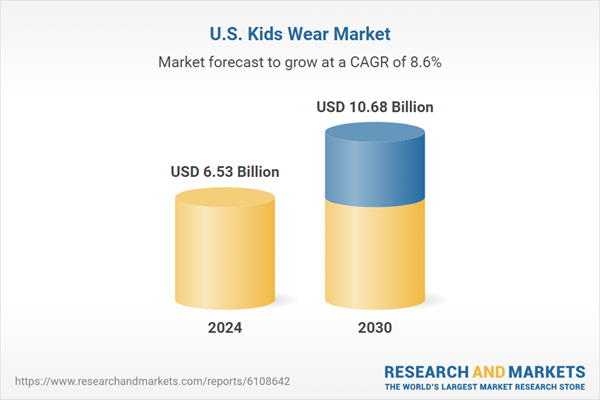Speak directly to the analyst to clarify any post sales queries you may have.
10% Free customizationThis report comes with 10% free customization, enabling you to add data that meets your specific business needs.
Key Market Drivers
Rising Disposable Income and Changing Lifestyle Patterns
The growth of disposable income among U.S. households plays a pivotal role in the expansion of the kids wear market. With higher spending capacity, families - particularly those with millennial and Gen Z parents - are investing more in premium, stylish, and branded clothing for their children. Dual-income households are on the rise, contributing further to discretionary spending. Parents today consider children’s fashion a reflection of lifestyle, often purchasing across a wide range of categories including formal, casual, seasonal, and activewear. The increasing frequency of clothing purchases, influenced by fashion trends and social media exposure, is also accelerating market momentum. Retailers and brands are responding with diverse, curated collections that cater to both the functional and aesthetic preferences of modern families.Key Market Challenges
Rapid Growth Spurts and Short Clothing Lifespan
A core challenge for the kids wear market in the U.S. is the short usable life of children’s apparel due to frequent growth spurts. While this creates recurring demand, it also raises concerns among parents about the practicality of investing in higher-priced garments. Many families opt for affordable or budget-friendly options, placing pressure on premium and mid-range brands to justify their value. Additionally, this short wear cycle contributes to growing textile waste, pushing brands to adopt more sustainable manufacturing and business practices. Balancing cost, durability, and sustainability remains a significant hurdle for companies aiming to retain consumer trust and adapt to evolving environmental and economic expectations. Managing fast inventory turnover and adjusting to rapid fashion cycles also pose operational challenges for retailers.Key Market Trends
Rise of Gender-Neutral and Inclusive Fashion
An important trend shaping the U.S. kids wear market is the surge in gender-neutral clothing driven by values of inclusivity, comfort, and self-expression. Parents are moving beyond conventional color-coded gender norms, opting instead for unisex apparel that emphasizes versatility and practicality. Brands are embracing this shift by launching collections with neutral tones, minimalistic styles, and inclusive messaging. Gender-neutral clothing not only appeals to socially progressive consumers but also aligns with sustainable practices, as such garments can be easily passed between siblings regardless of gender. Retailers are also adapting merchandising strategies by organizing clothing by size or function instead of gender. This trend resonates particularly with younger parents who prioritize equality, individuality, and modern parenting philosophies, encouraging long-term loyalty to inclusive and values-aligned brands.Key Market Players
- Marks and Spencer plc
- H & M Hennes & Mauritz AB
- BrainBees Solutions Limited
- The Children's Place, Inc.
- Dolce & Gabbana S.r.l.
- Industria de Diseno Textil, S.A.
- Carter’s, Inc.
- Ralph Lauren Corporation
- Under Armour, Inc.
- Gap Inc.
Report Scope:
In this report, the United States Kids Wear Market has been segmented into the following categories, in addition to the industry trends which have also been detailed below:United States Kids Wear Market, By Product Type:
- Apparel
- Footwear
- Accessories
- Others
United States Kids Wear Market, By Category:
- Boys
- Girls
- Unisex
United States Kids Wear Market, By Distribution Channel:
- Supermarkets/Hypermarkets
- Specialty Stores
- Exclusive Stores
- Online
- Others
United States Kids Wear Market, By Region:
- South
- West
- Midwest
- Northeast
Competitive Landscape
Company Profiles: Detailed analysis of the major companies present in the United States Kids Wear Market.Available Customizations:
With the given market data, the publisher offers customizations according to a company's specific needs. The following customization options are available for the report.Company Information
- Detailed analysis and profiling of additional market players (up to five).
This product will be delivered within 1-3 business days.
Table of Contents
Companies Mentioned
- Marks and Spencer plc
- H & M Hennes & Mauritz AB
- BrainBees Solutions Limited
- The Children's Place, Inc.
- Dolce & Gabbana S.r.l.
- Industria de Diseno Textil, S.A.
- Carter’s, Inc.
- Ralph Lauren Corporation
- Under Armour, Inc.
- Gap Inc.
Table Information
| Report Attribute | Details |
|---|---|
| No. of Pages | 82 |
| Published | July 2025 |
| Forecast Period | 2024 - 2030 |
| Estimated Market Value ( USD | $ 6.53 Billion |
| Forecasted Market Value ( USD | $ 10.68 Billion |
| Compound Annual Growth Rate | 8.6% |
| Regions Covered | United States |
| No. of Companies Mentioned | 10 |









